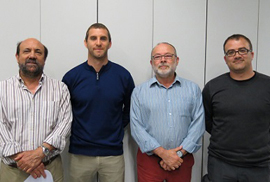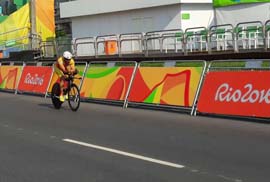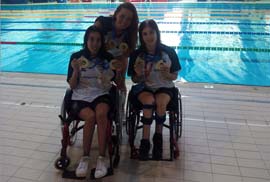
The celebration of the America’s Cup has generated more negative legacies than positive for the city of Valencia from the socieconomic point of view, in the urban development and in the infrastructures, in the sport and at a sociocultural level. The Group of Research in Management and Organisation of Sport of the Universitat de València (in which our Master’s Director, Vicente Año and two professors, Daniel Ayora and Ferran Calabuig participated) just published an article in which it also points out that the event has raised a bigger consensus in image, political benefits, administrative and of external recognition.
25 may 2016
The majority of participants in the study also agree in highlighting some of the negative legacies derived from the event such as the increase of prices of goods and services in the city or the worsening of the image and reputation of the city as a consequence of the subsequent disuse of some of the infrastructures of the event. There does exist greater agreement in promotion of the city as a tourist destination, in the increase of the international international recognition and the ability of the Valencian society of hosting and organising big sporting events.
These are some of the conclusions of ‘Percepción de los residentes sobre el legado de la America’s Cup’ (‘Perception of the residents of the America’s Cup legacy’), an article published by the Group of Research in Management and Organisation of Sport to analyse the impact of the America’s Cup (AC) that is based on 785 questionnaires, from which 735 were valid, among residents in Valencia, with an average age of 34.6 years and of which a 48% had university studies.
This way, the results have identified three types of groups of neighbours regarding their attitude towards the legacy of the event: the optimists, the indifferent ones and the pessimists. David Parra, researcher of the Faculty of Physical Activity and Sport Sciences and main author of the article published in the journal ‘Cuadernos de Psicología del Deporte’, explains that the group with a higher proportion in the analysis is the one of pesimist residents (49.9%) that do not consider that the event has generated any positive legacies for the city but negative. ‘Instead, the group of positive residents, which proportion is the smallest one (14.7%), perceives that the event has generated positive legacies in the different analysed areas and does not consider any negative legacies’ explains.
Finally, there is the group of residents indifferent to the legacy of the AC, which is of a 38.4% and understands that the event has supposed a positive legacy in image, recognition and at a political level but not in other areas such as urban development and infrastructures, sport or at a sociocultural level.
The four researchers who are authors of the work, David Parra, Vicente Añó, Ferran Calabuig and Daniel Ayora, stand out that the analysis of the perception of the residents about the impacts in the long-term or about the legacies of the sporting events permit to know the social impact of this kind of events in the host communities. ‘On the other side, this kind of studies provide information that has to be taken into account to improve the management and planning of events from the organising committees and administrations’, according to David Parra.
Experts warn that most of the researches that have been carried out about the AC in Valencia have been done before, during its celebration or in the two years immediately after the celebration of the first edition of the event and they have been focused in the economic aspect, not so much in perception. ‘Due to the fact that perceptions change in time, it is convenient to consult them periodically to observe the changes in its evolution’, as it is told in the article.
Other works quoted in the research economically quantify the benefits of the America’s Cup. In this way, one from the Valencian Institute of Economic Research from 2007 asserts that the event supposed an impact of 5,748 billion euros in terms of production and 73,859 jobs during the period 2004-2007. It is also pointed out the research carried out by the Universitat de València in 209, in which the majority consulted considered the realisation of the America’s Cup as a beneficial fact for the city (83.8%) and a 81.6% agreed with the possibility of promoting the realisation of this kind of sporting mega-events.
Method
The survey carried out by the research group of the Universitat de València has consisted of a scale of 41 items with different positive and negative legacies grouped in six dimensions: socioeconomic legacy; urban development and infrastructures; image, politics and recognition; sports legacy; sociocultural legacy: and negative. The results allowed to identify three groups with different perceptions of the legacy of the America’s Cup: pessimists (46.9%), the indifferent ones (38.4%) and optimists (14.7%). Among the people that answered the questionnaire, a 58.6% are men and a 41.4% are women.
In the selected sample, around one third of them were students (34.6%) and a 31.3% had a full-time job. The fieldwork was carried out during the last trimester of 2013 with a group of interviewers trained specifically for the job and who were informed of the characteristics of the study.
Impact of sporting events
The work is part of a research line focused on the analysis of social impact of the sporting events that have been developing from 2011 in the Group of Research in Management and Organisation of Sport of the Universitat de València. This study complements works carried out by the group among which it has been analysed the social impact of sporting events such as the European Grand Prix, the Valencia Open 500, the Valencia Boat Show, the Marthon or the Valencia Triathlon.
In this regard, researchers point to the need of ‘planning the legacy of a sporting event in all of its dimensions, from the first stages of the candidature of the city to the organisation of the event’, a fact that in a case like the America’s Cup implies ‘keeping in mind the social sustainability of the event, which will depend on the benefits and costs resulting from the hosting of it’.
Article:
Vicente Añó Sanz, David Parra Camacho, Daniel Ayora Pérez and Ferran Calabuig Moreno. “Percepción de los residentes sobre el legado de la America’s Cup”. Cuadernos de Psicología del Deporte, vol. 16, 1, 325-338. ISSN print edition: 1578-8423. ISSN web edition (http://revistas.um.es/cpd): 1989-5879
Caption:
(From left to right). Vicente Añó Sanz, David Parra Camacho, Daniel Ayora Pérez and Ferran Calabuig Moreno.










